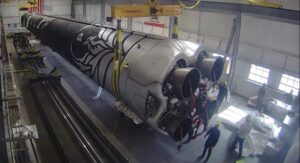26 about investment in the space industry, Tom Markusic, chief executive of Firefly Aerospace, said the funding the company is trying to raise will support its long-term growth as it brings its Alpha launch vehicle into service and develops a medium-class launch vehicle, Beta.
“In the next five years we want to take Firefly from a $1 billion company when we go out and fly Alpha and the SUV,” he said, a reference to an upper stage called the Space Utility Vehicle that can serve as a space tug, “to in about five years being on the order of a $10 billion company.”
Markusic said $125 million of the funding would go toward “production enhancements,” such as facilities and tooling needed to ramp up launch vehicle production. That would include equipment used in the aircraft industry to produce large carbon-fiber composite structures that Firefly wants to apply to its vehicles. “What that means is that it will really help us realize that low-cost vision that we have for the company.”
The other $225 million would support growth initiatives, in particular a medium-class vehicle capable of placing 10 tons into orbit, about 10 times the capacity of Alpha. The company wants to make a first launch of that larger vehicle by early 2024.
Firefly Aerospace emerged from Firefly Space Systems, which filed for bankruptcy in 2016 after a funding round fell through. Entrepreneur Max Polyakov and his investment fund, Noosphere Ventures, bought Firefly out of bankruptcy and funded its operations.
“Our development phase was $200 million, and that was funded by Max Polyakov and Noosphere Venture Partners. Those were the folks that had an appetite for that early, high-capex, high-risk phase,” Markusic said. “We owe a lot to Noosphere and Max for doing that.”
He suggested, though, that the additional funding would come from other sources. “Where that growth capital comes from, we’re sort of ambivalent,” he said. “Overall, we’re just looking for the route that best provides that growth capital without impeding our ability or fundamentally changing our culture as a nimble, fast-moving space development company.”
A $350 million round would be large, but not unprecedented, for an early-stage space company. Relativity Space, which is developing a small launch vehicle with a payload performance in the same class as Alpha, raised $500 million in November 2020 to support its long-term plans.
Firefly, after its rebirth in 2017, is finally nearing the first launch of its Alpha vehicle. Markusic said that launch, from Vandenberg Air Force Base in California, is scheduled for “a few short weeks” but was not more specific.
Space for SPACs
Later in the webinar, Markusic was asked if Firefly planned to go public. “We’re looking for that growth capital, and whatever the most efficient mechanism is, is the route we’ll go,” he said. He noted, though, that going public might adversely affect the company’s culture, including the ability to make decisions quickly. “I’m a bit apprehensive, because I don’t know if I’d have the same flexibility that I’d have with private funding.”
Other participants in the two-hour event were more bullish about going public, particularly through a mechanism known as special-purpose acquisition companies, or SPACs. Such “blank check” companies go public to raise money, then merge with a privately held company. SPACs allow companies to go public outside of the traditional initial public offering process, and do so more quickly.
Virgin Galactic went public through a merger with a SPAC, Social Capital Hedosophia, in 2019. Last year, Momentus and AST & Science announced plans to merge with SPACs, although neither deal has yet closed.
“The SPAC had a lot of advantages,” Abel Avellan, chief executive of AST & Science, said at the webinar, such as timing. “We simply see it as a financial vehicle to finance our major step.”
“What’s happened over the last year and a half, starting with Virgin Galactic, was that now there’s a new path” for companies seeking funding, said Scott Wisniewski, managing director of the Technology, Media & Telecom Group at Barclays. “The SPAC product has been a facilitator of that.”
There’s been criticism of the SPAC approach, though, in part because of what’s perceived as less scrutiny of companies going public in that way. Both AST & Science and Momentus are facing regulatory issues, including concerns about Momentus’ foreign ownership that led to the resignation of chief executive Mikhail Kokorich Jan. 25 and objections to AST & Science’s proposed satellite constellation on orbital debris and radio-frequency interference grounds.
Panelists, though, played down that criticism. “One of the misnomers is that a SPAC is a backdoor way of going public, and there’s less disclosure requirements put upon a company. That’s not the case,” said Phil Denning, partner in ICR, a strategic communications and advisory firm. Companies still have to provide “traditional disclosures” about their finances, he said, but can also provide additional information like revenue projections.
Karen Snow, head of U.S. East Coast listings and capital markets at Nasdaq, said there is due diligence from the SPAC itself as well as additional private investors who participate in such deals. “The more and more companies that we see leverage the SPAC option, and trade well, of course, the more and more it will be viewed as just another way to access the markets.”



